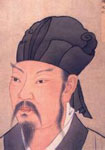“容衣入夜台”的意思及全诗出处和翻译赏析
“容衣入夜台”全诗
高居朝圣主,厚德载群生。
武帐虚中禁,玄堂掩太平。
秋天笳鼓歇,松柏遍山鸣。
威仪备吉凶,文物杂军容。
配地行新祭,因山托故封。
凤飞终不返,剑化会相从。
无复临长乐,空闻报晓钟。
追攀万国来,警卫百神陪。
画翣登秋殿,容衣入夜台。
云随仙驭远,风助圣情哀。
只有朝陵日,妆奁一暂开。
作者简介(韩愈)

韩愈(768~824)字退之,唐代文学家、哲学家、思想家,河阳(今河南省焦作孟州市)人,汉族。祖籍河北昌黎,世称韩昌黎。晚年任吏部侍郎,又称韩吏部。谥号“文”,又称韩文公。他与柳宗元同为唐代古文运动的倡导者,主张学习先秦两汉的散文语言,破骈为散,扩大文言文的表达功能。宋代苏轼称他“文起八代之衰”,明人推他为唐宋八大家之首,与柳宗元并称“韩柳”,有“文章巨公”和“百代文宗”之名,作品都收在《昌黎先生集》里。韩愈在思想上是中国“道统”观念的确立者,是尊儒反佛的里程碑式人物。
《大行皇太后挽歌词三首》韩愈 翻译、赏析和诗意
《大行皇太后挽歌词三首》是韩愈在唐代创作的一首诗词。以下是我为您提供的中文译文以及对该诗词的诗意和赏析:
诗词中文译文:
一纪尊名正,三时孝养荣。
高居朝圣主,厚德载群生。
武帐虚中禁,玄堂掩太平。
秋天笳鼓歇,松柏遍山鸣。
威仪备吉凶,文物杂军容。
配地行新祭,因山托故封。
凤飞终不返,剑化会相从。
无复临长乐,空闻报晓钟。
追攀万国来,警卫百神陪。
画翣登秋殿,容衣入夜台。
云随仙驭远,风助圣情哀。
只有朝陵日,妆奁一暂开。
诗意和赏析:
这首诗词是韩愈为了表达对已故的皇太后的悼念之情而创作的。诗中表达了对皇太后一生的赞美和怀念。
首先,诗词提到皇太后在一生中享有崇高的声望,她的孝养之德在三代中都受到了荣耀的赞扬。她高位居于朝廷,成为崇高的统治者,以她的厚德滋养着万民。
接着,诗中描绘了皇太后的离世给大殿带来了悲痛的氛围。武帐空虚,玄堂寂静,笳鼓声在秋天停止,松柏树在山中哀鸣。这些描写营造了一种庄严肃穆的气氛,以表达对皇太后的深切哀思。
诗中还提到皇太后庄严的仪态,她的文物和军容杂乱无章地摆放在一起。她的行为和仪态不仅体现了她的威严,而且也是对她的尊敬和纪念。
诗词的结尾描述了皇太后的去世对整个国家和人民的影响。她的去世象征着凤凰不再归来,剑化为亲人的陪伴。再也没有人能够在长乐宫中见到她的身影,只能听到黎明时分的钟声报告着新的一天的到来。人们纷纷追忆她的辉煌,守护百神的安宁。
最后几句描写了画像和容貌,皇太后的形象仿佛登上秋殿,她的衣装和妆容也仿佛进入了夜晚的台阶。云随着仙人的驾驭而远去,风助长眠者的悲伤。只有在朝陵之日,她的妆奁才会暂时打开。
这首诗词通过对皇太后的赞美和怀念,表达了作者对她的敬仰和感激之情,同时也展现了对逝去的人的思念和对生命的短暂的感The following is a translation and analysis of the poem "Three Laments for the Late Empress Dowager" by Han Yu, a poet from the Tang dynasty:
Poem Translation:
In a single era, esteemed and righteous,
Three times honored for filial devotion.
She resided high as the sacred ruler,
Her abundant virtue benefiting all.
Within the empty military tent, prohibitions held,
The mysterious hall concealed tranquility.
Autumn's flute and drum cease their sound,
Pines and cypresses throughout the mountains mourn.
Her dignified presence accommodated both auspicious and ominous occasions,
Cultural artifacts mingled with military appearance.
To the land, she performed new rituals,
Upon the mountains, she entrusted ancestral tombs.
The phoenix flies, never to return,
Swords transform, meeting in the afterlife.
No longer present in the palace of eternal joy,
Only the sound of the morning bell is heard.
She pursued the arrival of countless nations,
Guarded by a hundred deities.
Her painted likeness ascends the autumn hall,
Her ceremonial garments enter the nightly platform.
Clouds follow the immortal carriage, distant and ethereal,
The wind assists the lamentable sentiment of the holy.
Only on the day of the imperial tomb's opening,
Will the bridal chamber be briefly unveiled.
Poetic Meaning and Analysis:
This poem, "Three Laments for the Late Empress Dowager," was composed by Han Yu to express his grief and admiration for the deceased Empress Dowager. It praises her accomplishments and reflects on her life.
Firstly, the poem mentions the Empress Dowager's esteemed reputation throughout her lifetime. Her filial piety was honored and respected for three generations. She held a high position as the ruler in the imperial court, and her virtuous conduct benefited the people.
The poem then portrays the solemn atmosphere that follows the Empress Dowager's passing. The military tent stands empty, and the mysterious hall conceals tranquility. The sounds of autumn's flute and drum cease, while the pines and cypresses throughout the mountains mourn. These descriptions create a sense of solemnity and grief, reflecting the poet's deep sorrow for the Empress Dowager's departure.
The poem also highlights the Empress Dowager's dignified demeanor. Her cultural artifacts and military regalia are intermingled, demonstrating her authority and reverence.
Furthermore, the poem describes the impact of the Empress Dowager's death on the nation and its people. Her passing signifies the phoenix's flight, never to return, and swords transforming to meet in the afterlife. She will no longer be present in the palace of eternal joy, but her memory lingers through the tolling of the morning bell. People recall her magnificence, and she is guarded by a hundred deities.
The final lines depict her portrait and appearance. The Empress Dowager's likeness ascends the autumn hall, and her ceremonial garments enter the nightly platform. Clouds follow her immortal carriage, symbolizing her distant and ethereal existence, while the wind intensifies the mournful sentiment of the holy. Only on the day of the imperial tomb's opening will her bridal chamber be briefly unveiled.
Through this poem, Han Yu expresses his admiration and gratitude for the Empress Dowager, as well as his longing and reflection upon the passing of a loved one. The transient nature of life and the eternal remembrance of the departed are recurring themes in this elegy.
“容衣入夜台”全诗拼音读音对照参考
dà xíng huáng tài hòu wǎn gē cí sān shǒu
大行皇太后挽歌词三首
yī jì zūn míng zhèng, sān shí xiào yǎng róng.
一纪尊名正,三时孝养荣。
gāo jū cháo shèng zhǔ, hòu dé zài qún shēng.
高居朝圣主,厚德载群生。
wǔ zhàng xū zhōng jìn, xuán táng yǎn tài píng.
武帐虚中禁,玄堂掩太平。
qiū tiān jiā gǔ xiē, sōng bǎi biàn shān míng.
秋天笳鼓歇,松柏遍山鸣。
wēi yí bèi jí xiōng, wén wù zá jūn róng.
威仪备吉凶,文物杂军容。
pèi dì xíng xīn jì, yīn shān tuō gù fēng.
配地行新祭,因山托故封。
fèng fēi zhōng bù fǎn, jiàn huà huì xiāng cóng.
凤飞终不返,剑化会相从。
wú fù lín cháng lè, kōng wén bào xiǎo zhōng.
无复临长乐,空闻报晓钟。
zhuī pān wàn guó lái, jǐng wèi bǎi shén péi.
追攀万国来,警卫百神陪。
huà shà dēng qiū diàn, róng yī rù yè tái.
画翣登秋殿,容衣入夜台。
yún suí xiān yù yuǎn, fēng zhù shèng qíng āi.
云随仙驭远,风助圣情哀。
zhǐ yǒu zhāo líng rì, zhuāng lián yī zàn kāi.
只有朝陵日,妆奁一暂开。
“容衣入夜台”平仄韵脚
平仄:平平仄仄平
韵脚:(平韵) 上平十灰 * 平仄拼音来自网络,仅供参考;诗句韵脚有多个的时候,对比全诗即可判断。